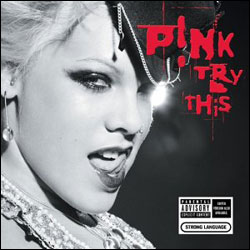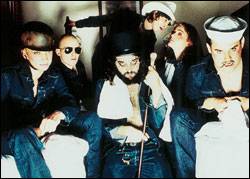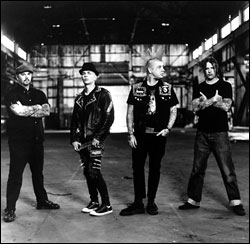Back in the early 1990s, when Riot Grrrl cried out for revolution girl-style now, neophyte bands were at its core. Advanced musicianship was largely optional. Like punk, this feminist movement reveled in the fact that no one had to know how to do something properly in order to do it. Grrrls sprung from the head of Hera fully formed but proudly dragged their placenta alongside. Politically speaking, it was hard not to love it—a movement by and for girls based on visibility, creative endeavors, and gender equality. But in Riot Grrrl, I felt the same exclusivity that dominates junior-high cliques, except this clique was full of artistic, yawping brainiacs. I understood why the movement flaunted its precocity, but the music irked the shit out of me: Prolonged exposure to Bikini Kill or Bratmobile made me want to jump out a window.
Along came Corin Tucker. After her first band, Heavens to Betsy, she formed Sleater-Kinney with Carrie Brownstein of Excuse 17. Their second album, 1996’s Call the Doctor, combined wisdom and craftsmanship while retaining Riot Grrrl’s immediacy and feistiness. Tucker wailed, “I’m not waiting till I grow up to be a woman,” so hard her throat quivered; panicked melodies hopped around on hot coals; Brownstein hissed from the pit of her stomach and struck every string on her guitar like they were live wires. The urgency was like a seizure, yet it felt like the band really ruminated on the tunes and struggled get them just right.
There’s a line in Ferris Bueller’s Day Off where Ferris describes his friend Cameron as “so tight that if you stuck a lump of coal in his ass, in two weeks you’d have a diamond.” Sleater-Kinney is Cameron’s ass. Whether writing about a crushworthy lady, vulnerability, or their love of rock and roll, Tucker, Brownstein, and drummer Janet Weiss, who joined for 1997’s Dig Me Out, diagrammed passion and prowess with intense precision. On each album, the trio is intricately tangled in one another’s nests, clenching hard and smacking around molecular energy like a pinball.
So the first few seconds of The Woods, the trio’s seventh album, come as a shock. Opening track “The Fox” is a full-on assault of buzzing, metallic strings and wattage mashed together and recalling . . . grunge. Coincidentally (or maybe not), this is S-K’s first album for Sub Pop—grunge’s ground zero—after five albums with Kill Rock Stars, located in Olympia, Riot Grrrl’s ground zero. Sounds like Brownstein and Tucker have been chowing on SuperfuzzBigmuff and getting in touch with Sub Pop’s grizzly roots.
Brownstein’s love for Tom Verlaine’s xylophonelike guitar precision is hardly absent, but the Sturm und Drang of The Woods could loosen Cameron’s rectal death grip even at low volume. Additionally, the strident pacing they adhered to for so long is overlooked in favor of a freer, more elastic feel. Previously, the band’s modus operandi was very get-in-get-out: “Oh!” (2002’s One Beat), “You’re No Rock n’ Roll Fun” (2000’s All Hands on the Bad One), and “Little Babies” (Dig Me Out) all ambushed college-radio airwaves with clean, sharp cuts that wasted no time. But now, S-K are indulging in rough edges, screwing around a bit, and getting their hands dirty. “What’s Yours Is Mine” romps around with the sexy mischief turned up to 11. Tucker begs, “Come on darling, let’s hang around, let’s wreck their precious, their perfect town,” like a renegade on Desperate Housewives.
Then a flashback interrupts the mood and things get dark. Brownstein yanks on her strings, echoing psych-rock bands like Comets on Fire and Dead Meadow (with whom S-K is touring), while sludge rises from the ground. Weiss clatter-and-bangs us back to the present, and the romp returns as if nothing happened. This fuzz-encrusted detour is jarring, and it happens over and over on this album, messing with space, time, and our own expectations. Take “Rollercoaster,” a ruffled, racy little ditty about reheating a lukewarm relationship. After the band establishes the song proper, a hefty, rusted sensation throws us onto a different track, before Brownstein shouts, “Want to get back to the way things were,” then a stark wind whistles, and we return to the initial melody.
There’s no going back on “Jumpers,” where someone’s on the Golden Gate Bridge contemplating taking the big drink. The music’s chilling restraint dissolves into a terrifying ending where Brownstein screams her eyeballs out of their sockets. The wrath doesn’t end there. On “Entertain,” a growling, heaving Brownstein bitch-slaps new-wave poseurs; she sounds like she wants to pick a fight with anyone willing to take a shot. Tucker is just as passionate: Referencing her royal flush and jewels spilling from her cup, she gets a case of the ol’ horn on the 11-minute libido jam, “Let’s Call It Love.” The lasso in her throat demands “slow moves and dirty tricks,” while smoke rises from cranky, tumbling rhythms.
She’s still begging on the closing song, “Night Light,” but this time it’s for guidance, and she slightly resents having to ask for help. Down-tuned guitars pile the weight on her burdened shoulders. “How do you do it,” she asks, “with visions of worst to come?” Sleater-Kinney admirably accept that they don’t know everything, proving a woman’s work is never done.
Sleater-Kinney play the Moore Theatre with Mary Timony at 8 p.m. Tues., May 31. $17.50.








